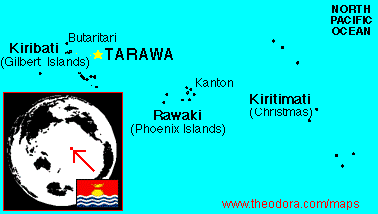|
People Want Light, Not Photovoltaics: The Islands of Kiribati
"People in rural areas living without electricity do not want a PV system. They want electricity to light their houses and to power their radios. On the remote islands of Kiribati in the Pacific, the insight that it is not the technology but rather the service that is in demand has proven to be a determining factor in providing a reliable, affordable and environmental electricity supply. " Herbert Wade, Solar Energy Research and Training Center, Naresuan University, Phitasnulok, Thailand. 6 There is virtually tons of literature touting the benefits of photovoltaic systems (solar paneling that converts sunlight into electricity) as "the" solution to rural electrification. Indeed, enthusiasm for PV systems is well deserved, as it is a "clean" renewable energy, and has proven to be the most cost-effective option for communities where electricity from a grid is not viable. This case examines such a population, the people on the islands of Kiribati, and some of the obstacles the project had to overcome when the emphasis was switched to the exciting prospect of the new technology from the real objective- what the technology provides. When the government of Kiribati decided it was time for policies that would promote rural electrification, it focused its efforts on providing off-grid photovoltaic systems to families at a low cost. PV systems were chosen because they offered the most cost-effective solution due to distances between the islands, a sparse population, and excellent solar conditions. The first step was the creation of a company in 1984, The Kiribati Solar Electric Company (SEC). SEC received funding from USAID (United States Agency for International Development), guidance from an American NGO (non government organization), and was majorly owned by the Kiribati government. The project seemed to encompass all the essentials for a successful marketing scheme- a demand for electricity, a high quality and affordable supply of systems, and a knowledgeable, local staff for low cost services. Things didn't go as planned. After an initial burst in sales, business sunk so low that the company couldn't even support the modest wages of the sales and servicemen. Although there was still large demand for electricity and an ability to pay for the services, people weren't buying the systems. The reason for this trend was apparently due to low customer satisfaction with the systems. They required a lot of maintenance and didn't fulfill expectations of performance. Word had spread of customer's dissatisfaction and sales dwindled. Instead of dismantling the company, the Kiribati government decided to turn it into a service as opposed to a sales provider in 1992 (funded by the Japanese government, and later, the EU). They owned and maintained solar home systems and provided electrical service to households charging only the recovery cost of production and labor. They were responsible for all maintenance issues, users only needed to worry about their own electrical appliances. The switch of objective from sales to service restored confidence in PV systems. As a result of the increased customer satisfaction, people walk in and ask to buy personal solar home systems, sans a marketing scheme. The case of Kiribati illustrates the importance of user credibility, without which any electrification project will not be successful. The technology is only a means to the end- improving people's lives. For further reading of the Electrification of the Islands of Kiribati: http://www.sei.se/red/red9703d.html or http://www.oja-services.nl/iea-pvps/products/download/rep9_07.pdf <<back || index || next>> |
